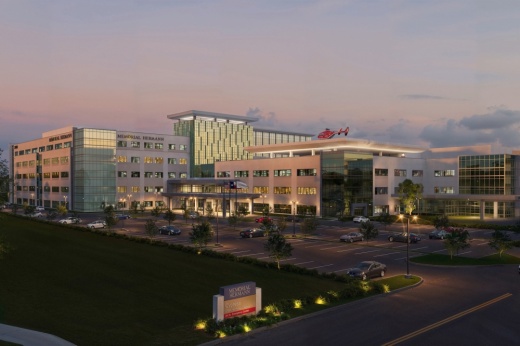About 30 miles northwest of the world’s largest medical complex, Cy-Fair’s health care landscape is growing with a $685 million hospital under construction and two others expanding for a total of $377.5 million.
Officials said “extreme” population growth is driving demand for access to health care services locally, and hospital leaders are focused on bringing quality care closer to home.
“Competition drives innovation, and I think ultimately, having the three major systems right on [Hwy.] 290 ... [is] absolutely going to improve lives and livelihoods by having this sort of competition right here,” said Justin Reed, assistant chief of EMS at the Cy-Fair Fire Department.
Hospitals are recruiting staff amid an ongoing shortage of health care workers, as reported by the Texas Department of State Health Services.

Nearly three years after breaking ground, the 569,100-square-foot Houston Methodist Cypress Hospital is set to open in March. Associate Chief Nursing Officer Nick Escobedo said he is already seeing the value its services will bring.
“For things like breast imaging and medical oncology services, which were kind of lacking in the Cypress community, now we’re bringing access,” he said.
In July, officials with Memorial Hermann Cypress Hospital announced plans to build a new six-story tower. New operating rooms, an additional cardiac catheterization lab and additional emergency beds are included in these plans.
“We just announced our third expansion in three years. That speaks to the growth that’s happening in this community,” said Jerry Ashworth, Memorial Hermann Cypress Hospital CEO.
Officials with HCA Houston Healthcare North Cypress announced plans in August to expand with a new three-story tower, including an acute rehabilitation unit and a medical surgical unit.
All three hospital campuses have additional capacity for growth beyond these projects, officials said.

Diving in deeper
While the state health department reports a growing demand for health care workers, supply is expected to trail behind for years to come.
Debby Hughes, director of human resources for Houston Methodist Cypress Hospital, said this shortage isn’t new. She said recruitment for all positions is in full swing.
Local hospital CEOs said they believe it’s crucial to partner with higher education institutions and to help inspire younger students to pursue careers in the medical field.
“How do we help them on their path to becoming a health care professional? It’s finding and starting and investing in that pipeline much, much earlier than we ever have before,” Ashworth said at a Cy-Fair Houston Chamber of Commerce economic forum held in September.
Ashworth said nursing schools need more state support as thousands of qualified applicants are turned away annually due to limited resources.
Warner Bair, instructional dean of allied health and public services at Lone Star College-CyFair, said his team is “very much aware” of health care workforce shortages, and their health care programs at the college operate near full capacity.What the experts say
- “If you look at just the growth here in Cypress coming up the [Hwy.] 290 corridor into Waller County, it’s just extreme growth that we need to keep up with.” -Jerry Ashworth, CEO, Memorial Hermann Cypress Hospital
- “We see access as directly related to quality. If you’re sick [and] you can’t get in, you can’t get diagnosed, ... it’s going to be harder to get you well as soon as you need to be to get back to your family.” -Trent Fulin, CEO, Houston Methodist Cypress Hospital
- “I think, for many, that drive into the Texas Medical Center is intimidating. When you’re hospitalized close to where you live, it affords a better opportunity for your family, for your friends, to participate in your care.” -Jim Brown, CEO, HCA Houston Healthcare North Cypress

Reed said it takes about 33 minutes for a Cy-Fair Fire Department ambulance to offload a patient at a local hospital before those first responders are available to respond to the next emergency. During a natural disaster, the process can take four hours, he said.
Before Memorial Hermann Cypress Hospital opened in 2017, most ambulance traffic went to what is now known as HCA Houston Healthcare North Cypress, Reed said. He believes adding hospital capacity along Cy-Fair’s main thoroughfare will “instantly” help relieve overloaded health care systems.
“We operate at 100% capacity many months of the year, and as a result, ... patients may wait for beds longer than we would like,” said Jim Brown, HCA Houston Healthcare North Cypress CEO. “By adding this additional capacity, it affords us the opportunity to expedite services to those patients that are waiting for beds.”Looking ahead
Houston Methodist Cypress Hospital CEO Trent Fulin said this hospital will leverage artificial intelligence, natural language processing and ambient technology as patients are seeking convenience in their health care.
James Langabeer, professor of emergency medicine and public health at UTHealth Houston, said enrollment in biomedical informatics, which studies how data can help solve problems in health care delivery, has increased 50% in the last five years.
Health care demand will also rise as the population ages; Langabeer said 75% of the average person’s health expenses occur in their last five years.
“We’ve been working hard to do our part to ... get more students interested and through our programs into that field,” Bair said.
Carson Weaver contributed to this report.





